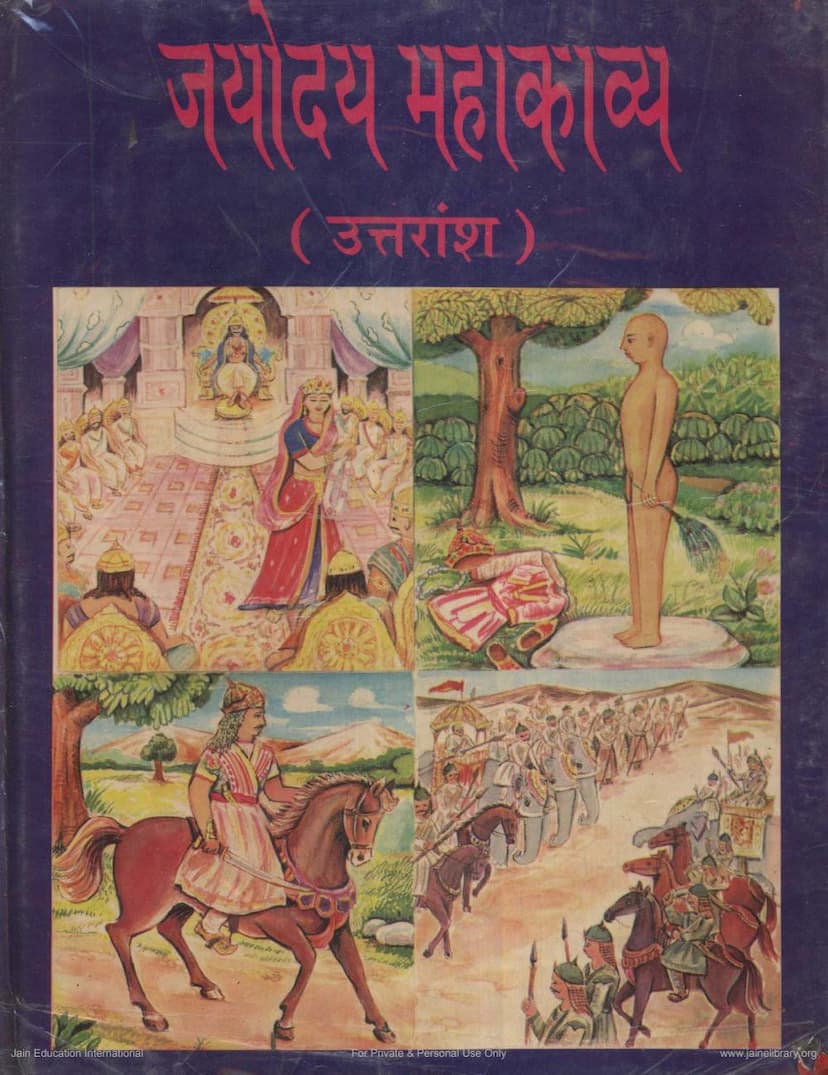Jayodaya Mahakavya Uttararnsh
Added to library: September 2, 2025

Summary
Based on the provided Jain text fragments, here is a comprehensive summary in English of the "Jayodaya Mahakavya Uttararnsh" by Bhuramal Shastri:
Overall Context:
The "Jayodaya Mahakavya Uttararnsh" is the second part of a larger epic poem. The text is a detailed narrative in Sanskrit, with a Hindi commentary provided by Dr. Pannalal Sahityacharya. The work is dedicated to Acharya Shri Vidyasagarji Maharaj and his disciple Muni Shri Sudhasagarji Maharaj. The publication was brought out by the Digambar Jain Samiti and Sakal Digambar Jain Samaj of Ajmer, Rajasthan, in commemoration of a Chaturmas (a four-month monastic retreat) in 1994.
Author and Background:
The original author and Sanskrit commentator of the Mahakavya was Shri Vaanibhooshan B. Brahmachari Pandit Bhuramalji Shastri, who later became Acharya Gyansagarji Maharaj. The text highlights his profound scholarship, dedication to Jain literature, and his life's journey from a scholar named Bhuramal to a renunciate Muni Gyansagar, and eventually an Acharya. His contributions are noted for keeping the tradition of Sanskrit Mahakavya composition alive in the 20th century.
Content and Narrative:
The "Jayodaya Mahakavya Uttararnsh" primarily focuses on the life and deeds of Jaykumar, a significant figure in Jain tradition, who was the Commander-in-Chief of Chakravarti Bharat and the son-in-law of King Akampan of Varanasi. The Uttararnsh (later part) of the epic continues the narrative, detailing various aspects of his life, his spiritual journey, and his interactions.
Key Themes and Portrayals:
- Jaykumar's Life and Character: The text elaborates on Jaykumar's exemplary life, highlighting his adherence to Dharma, his wisdom, his valor, and his deep devotion to spiritual practices. His character is portrayed as ideal, embodying virtues like strength, wisdom, and adherence to Jain principles.
- Courtly Life and Diplomacy: The narrative depicts the grandeur of Jaykumar's court, his interactions with the king, ministers, and the general populace. It touches upon his administrative skills and his approach to governance and diplomacy.
- Spiritual Endeavors and Renunciation: A significant part of the narrative is dedicated to Jaykumar's spiritual journey. It describes his eventual detachment from worldly affairs, his deep contemplation, and his ultimate path towards liberation (Moksha). The text emphasizes his commitment to Jain teachings.
- Literary and Poetic Merit: The Mahakavya itself is lauded for its extensive use of Sanskrit language, its detailed descriptions, its mastery of poetic devices (Alankars like Shlesh, Upama, Rupak, Vakraokti, etc.), and its adherence to Mahakavya conventions. The detailed descriptions of nature, courtly life, and spiritual practices showcase the author's literary prowess.
- Inspiration from Jain Philosophy: The work is deeply rooted in Jain philosophy, emphasizing concepts like detachment, righteousness, and the path to spiritual liberation. The narrative often uses allegorical language and subtle meanings (Vakrokti and Shlesh) to convey profound spiritual truths.
- The Role of Women: While the primary focus is on Jaykumar, the text also portrays the characters of women, particularly Sulochna, Jaykumar's wife. Her devotion, beauty, and adherence to dharma are highlighted. The interactions between Jaykumar and Sulochna, though sometimes described poetically with descriptions of physical beauty, are generally portrayed within the bounds of dharma and virtue.
- The Author's Literary Style: The author, Bhuramal Shastri (Acharya Gyansagar), is praised for his remarkable personality and literary talent, which is evident in the grandeur and depth of the "Jayodaya Mahakavya." His ability to write in Sanskrit in an era when Sanskrit epics were rare is particularly noted.
Specific Narrative Points Gleaned from the Text:
- The text describes Jaykumar's administration and his interactions with various people, including the citizens and his own court.
- There are detailed poetic descriptions of natural scenes, such as sunsets, seasons, and the beauty of the land, which are used metaphorically to highlight the narrative's themes.
- The text delves into the intricacies of human emotions and relationships, particularly those within the royal court and between Jaykumar and his wife, Sulochna, often employing poetic language and imagery.
- The narrative also touches upon the philosophical aspects of Jainism, emphasizing the pursuit of spiritual knowledge and liberation.
- The inclusion of the "Virasang" (possibly a section on monastic discipline or conduct) and the detailed summaries of each chapter (Sarg) provide a structural overview of the epic's progression.
In Summary:
The "Jayodaya Mahakavya Uttararnsh" is a significant work of Jain literature that celebrates the life of Jaykumar, a righteous ruler and spiritual seeker. It is a testament to the author's profound scholarship and his ability to blend historical narrative with philosophical depth and poetic beauty. The Mahakavya serves as an inspiration for spiritual pursuit and upholds the values of Jainism.